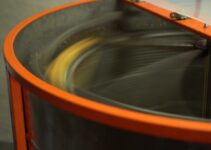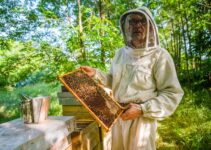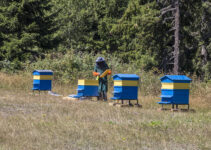Besides being known for its southern charm, the Mississippi River, bluegrass music, and catfish, the state of Mississippi has a subtropical climate with humid, hot summers and relatively short, mildly cool winters. This makes the climate good for beekeeping, but what does the law in Mississippi say about beekeeping?
Beekeeping laws in Mississippi control disease, parasites, pests, and unwanted bee strains. All bees transported in or out of the state must be inspected and certified by an inspector from the Bureau of Plant Industry, a section of the Mississippi Department of Agriculture and Commerce.
Beekeeping state laws in Mississippi are mostly for controlling the spread of disease, bee pests and parasites, and unwanted bee strains. Local regulations for beekeepers are mostly governed by municipal and city by-laws in the region where you live and require investigation to be compliant.
What Are The Laws For Keeping Bees In Mississippi?
Mississippi has a long beekeeping and honey industry history and was the top honey producer in the United States in the early 1920s.
Although other states now produce more honey than Mississippi, the state is still an important contributor to the country’s honey industry.
The mild winters promote forage for bees year-round, and many beekeepers in states north of Mississippi relocate their beehives to Mississippi to overwinter.
Mississippi has some of the most relaxed beekeeping regulations from a state perspective, but this does not mean that there are no laws governing the keeping of bees in this state.
Most of the state laws regarding beekeeping are intended to control the spread of bee diseases, parasites, and unwanted bee species.
Must Beekeepers Register In Mississippi?
Beekeepers are not required to register with the state to keep bees, but there are some best practice guidelines for beekeepers that the state stipulates for beekeepers.
The beekeeping industry in Mississippi is regulated by the office of the Bureau of Plant Industry (BPI), a subsection of the Mississippi Department of Agriculture and Commerce.
The State Entomologist and State Apiary Inspector are responsible for inspecting bee colonies and equipment in and out of the state and issuing certificates for transporting the bees and equipment.
The following are the main beekeeping guidelines laid out by the department.
| Requirement | Description |
| Registrations | Registrations are not required, but apiaries can be registered with the Bureau of Plant Industry |
| Disease control | All apiaries must be treated with approved chemicals to control diseases in bee colonies. |
| Transport control | Diseased bees, pest-infested bees, or Africanized bees must not knowingly be brought into the state.Colonies must be inspected before permits are issued to move bees and equipment in or out of Mississippi.Permits must be obtained from BPI before bringing bees or equipment into the state or transporting bees or equipment out of the state. |
| Breeding control | All beekeepers breeding queens or packaged bees for sale must have their operation inspected annually by BPI for disease, parasite, and pest control. The colonies will also be inspected for Africanized bees. Clearance certificates must be shipped with the bees. |
| AFB control | If more than 2% of an apiary is infected with American Foul Brood, the apiary must be quarantined and the infected hives destroyed under the supervision of an authorized inspector |
| EFB control | European Foul Brood is another bee disease that requires state notification. If more than 5% of the apiary is infected with EFB, the apiary must be quarantined and the affected colonies treated with approved antibiotics. The apiary must remain quarantined for up to 30 days after treatment. |
| Bees must be netted during transport | All bees must be netted during transport in Mississippi to prevent bees from escaping. |
Mississippi is a southern state afflicted by frequent extreme weather, especially during hurricane season. Extreme weather can have a negative impact on apiaries and beekeeping practices.
It is in the interest of Mississippi beekeepers to take steps to construct and prepare their apiaries for hurricanes and flooding. The government has put out a document with guidelines to prepare your apiary sites for hurricanes and how to take care of them after bad weather events.
How Many Bee Hives Can You Keep In Mississippi?
The state does not regulate the number of hives a beekeeper may keep, but this does not mean you have carte blanche to keep as many beehives as you want.
Most local municipalities in Mississippi have regulations to control beekeeping in urban and suburban areas from the point of view of public safety and nuisance value.
It is important that you find out your local by-laws in the area where you live in Mississippi to establish the local regulations regarding how many hives you can keep and the rules regarding where they can be positioned on your property.
Mississippi Beekeeping Associations
The best way to keep current with the local legislation changes in your area regarding beekeeping is to take up a membership with your local beekeeping association.
These associations share knowledge and experience and are a valuable resource for keeping beekeepers current with the latest local beekeeping regulations.
| Beekeeping/Association | Contact |
| Mississippi Beekeepers Association (State Association) | https://mshoneybee.org/ State association representing 500+ members from local bee associations across the state. |
| North-East Mississippi Beekeepers Association | mascadine@yahoo.com https://www.facebook.com/groups/1741659002732718/ |
| Munroe County Beekeepers | https://www.monroecountybeekeepers.org/ |
| Delta Area Beekeepers Association | https://deltabeeclub.org/ |
| North Central Mississippi Beekeepers Association | mascadine@yahoo.com |
| Central Mississippi Beekeepers Association | http://www.msbeekeeping.com/ |
| Lowndes County Beekeepers | ran18@msstate.edu |
| Attala-Leake County Beekeepers | wboshart@ext.msstate.edu taylorc@ext.msstate.edu |
| East Central Mississippi Beekeepers Association | jerrywoodson20@yahoo.com |
| Meridian Beekeepers Association | http://www.meridianbeekeepers.com/ |
| South-East Mississippi Beekeepers Association | cdeewaites@aol.com https://www.facebook.com/South-East-Mississippi-Beekeepers-Association-1799551956946733/ |
| South-West Mississippi Beekeepers Association | meguice@ftcweb.net http://swmsbeekeepers.org/ |
| Marion County Beekeepers Association | annabees@yahoo.com http://mcbawv.com/youth-beekeeping-program/ |
| Pine Belt Beekeepers | rao12@msstate.edu https://www.facebook.com/Pinebeltbees |
| Red Creek Beekeepers Association | homefix@cableone.net Facebook page |
| Gulf Coast Beekeepers Association | https://www.facebook.com/Mississippi-Gulf-Coast-Beekeepers-Association-420468874710336/ |
Conclusion
Beekeeping in Mississippi is an important part of the state’s economy and is encouraged as a form of agriculture. Hobbyist beekeepers are not regulated by state laws, but must find out local by-laws regarding beekeeping where the apiary will be located.
Becoming a member of a regional beekeeping association is the best way to stay current and compliant with the latest beekeeping regulations in Mississippi!
References
https://www.abfnet.org/page/mississippi?
https://library.municode.com/ms/
https://www.climatehubs.usda.gov/sites/default/files/Beekeepers%20Guide%20Mississippi.pdf
http://extension.msstate.edu/agriculture/livestock/beekeeping
https://www.law.cornell.edu/regulations/mississippi/2-Miss-Code-R-SS-1-3-06-103




